#more pointing out the comedy of the scene from Percy’s perspective who has a good grasp on healthy vs unhealthy relationships
Text
The Most Affecting Films of 2017
I love putting this list together because a.) I’m a film geek and own it, b.) this writing exercise is cheaper than therapy, and c.) it helps me discover previously unrecognized themes shared across my selections. The thread of history runs through these picks, that of nations as well as the complex and messy relationships between parents and children. History is parent to our present, and thus the thematic through line of my favorite movies of 2017. Each title brought me to tears or rented space in my mind for days after the initial viewing, often both, but earned this response through quality of storytelling.
Choosing my top ten was difficult (see the following “Runners Up List” for evidence) because 2017 was a fine year in film. We should celebrate cinema, and the opportunity to do so, as long as it remains this dynamic.
-Matt
Honorable Mention: Their Finest
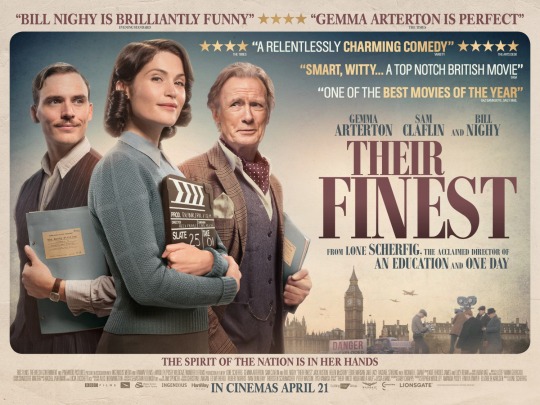
Directed by Lone Scherfig
Written by Gaby Chappe and Lissa Evans
A movie celebrating storytelling and writing, chronicling the making of a movie about the Dunkirk rescue, set in England during the Blitz, addressing the role women played in the war effort, packed with an embarrassment of Britain’s best character actors, exploring how cinema’s escape can help heal us in times of crisis, and that is also a love story has no right to work. Scherfig’s film defies such limitations and hops between these aspects like a trapeze artist. It’s a crowd-pleaser, a heartbreaker, and a movie celebrating movies, all buoyed by Gemma Arterton in the lead.
10. The Lost City of Z
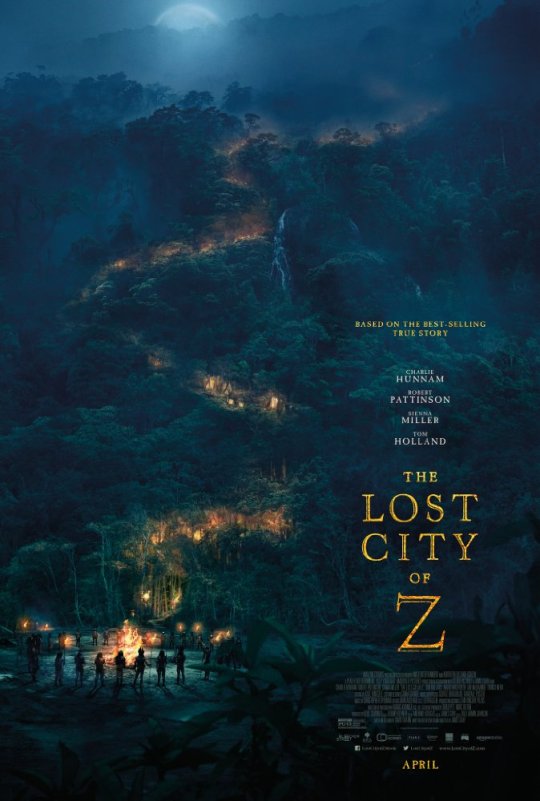
Written and Directed by James Gray
Cinematography by Darius Khondji
The real Percy Fawcett’s 1925 disappearance in the Brazilian jungle provides an unanswerable question that hangs over Gray’s film as he endeavors to explore mysteries of the egocentric self through immersion in the natural world. Like the protagonist, this seems simultaneously paradoxical and fitting.
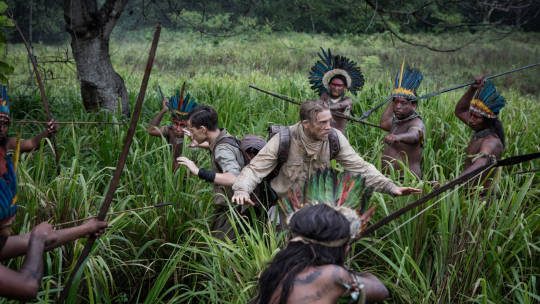
Some clever non-linear editing and a final shot of Nina Fawcett, the only actual hero here, walking into the reflected image of a jungle, make for a lingering metaphor on those understandings our hearts are granted, and those we can never attain.
9. Toni Erdmann*
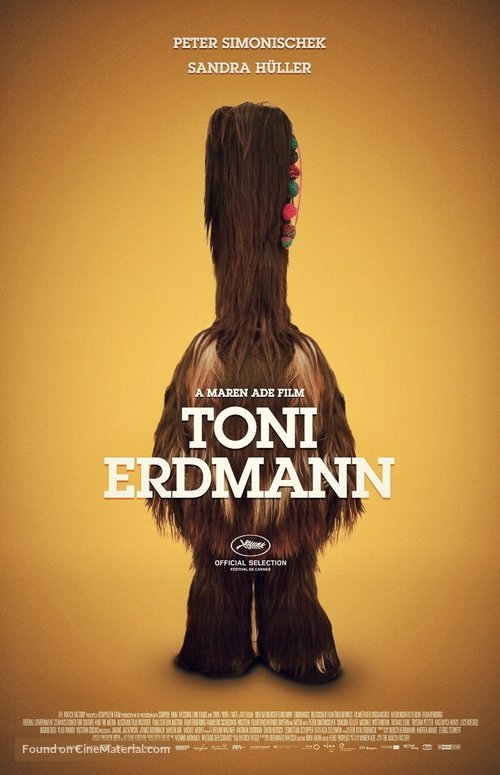
Written and Directed by Maren Arden
When I thought this dark European comedy couldn’t get more surreal or funny, it didn’t, but instead ends with a peerless final beat, then drops The Cure’s “Plainsong” over the credits.
Cut to me radiant with joy at what cinema makes possible.
Hollywood stories of parents and children aren’t ever this delightfully weird, or dappled with scenes that let us find our own insights about economic disparity, sexism, and capitalism’s darker outcomes. Hollywood stories aren’t ever this genuine.
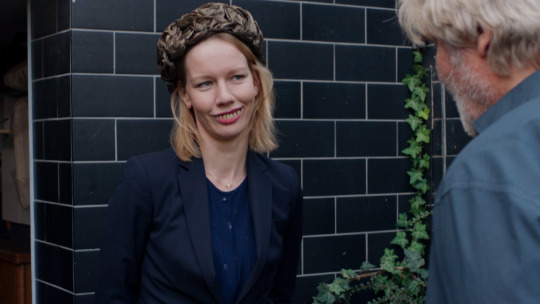
Maren Arden proves herself a visionary, not just among up-and-coming female directors, but all directors, and since her open-ended final scene is perfection, I’ll let the last dialogue in her script finish the same way:
The problem is, [life is] so often about getting things done. And then you still have to do this, or that. And, in the meantime, life just passes by. But how are we supposed to hang on to moments?
* released in 2016 but I had no way to see it until 2017
8. The Big Sick
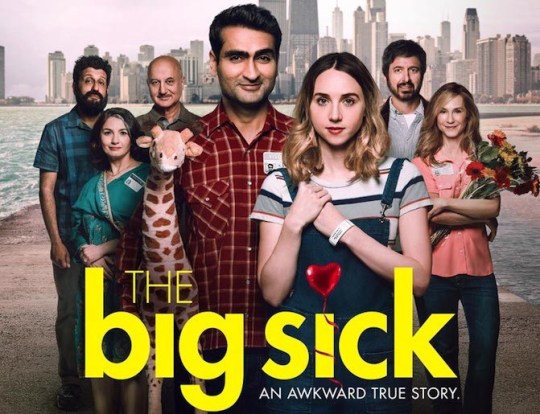
Directed by Michael Showalter
Written by Emily V. Gordon & Kumail Nanjiani
Gordon and Nanjiani’s story (based on the origin of their own marriage) took me two viewings across two seasons to relent and finally love it. Now it has my whole heart thanks to an earned emotional response and a script respecting the perspectives of all its characters. Likely the best screenplay of the year that might not be recognized as such, stand up comedy and parents are rarely revealed onscreen with such nuance, and never before in the same film.
7. Five Came Back
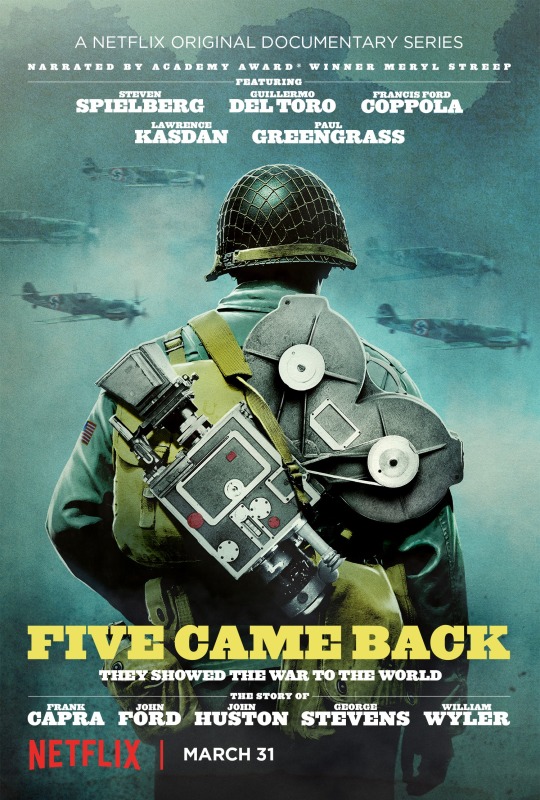
Written by Mark Harris (based on his book Five Came Back: A Story of Hollywood and the Second World War)
Directed by Laurent Bouzereau
This three-part Netflix documentary chronicles the contributions from five of the top directors in Hollywood during WWII, many of whom gave up lucrative careers to serve the war effort via their craft. We see how filmmaking and storytelling, as the translation of fact and occurrence through moving image, can be a weapon and should be used with care. The stories of these five directors and how their lives and art were impacted by the conflict is engagingly humane. And the talking heads (aka legendary current filmmakers) are so damn insightful. MVP being Guillermo Del Toro.
We celebrate such humanity, and in it our own, flawed and beautiful as both might be. This is best captured in Capra’s final voiceover proposing hope where it is needed.
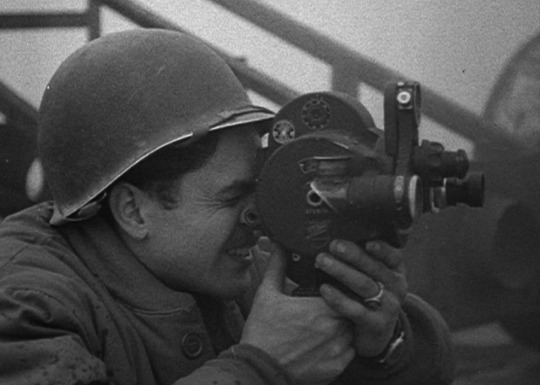
6. Wind River
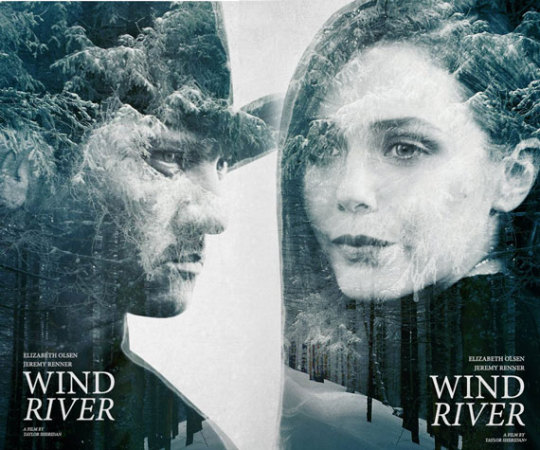
Written and Directed by Taylor Sheridan
Sheridan’s crime-as-myth story is most concerned with grief and the ways we numb ourselves to pain at the cost of the memories of loved ones lost. Winter and the West stand in a neo-western backdrop where he colors the idea of how struggle can hollow out even the strongest among us.
We get our genre kicks in the Mexican Standoff shootout (praise to the screenplay-rulebook shredding use of editing and a flashback to set up this reckoning). The patience in ending his film with not one but two conversation scenes shows a preference for empathy over spectacle, and the way the injured souls connect therein haunts me.
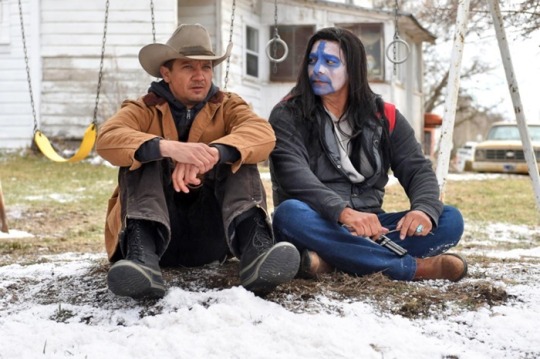
5. Three Billboards outside Ebbing, Missouri
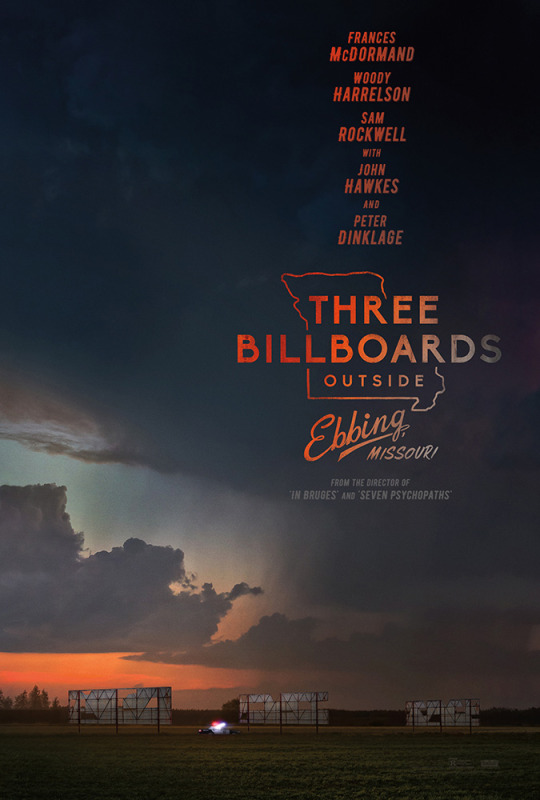
Written and Directed by Martin McDonagh
I enjoy being challenged by a film. McDonagh’s picture beat the shit out of me then tossed me a lollipop, and I beamed like a lovestruck idiot. An early reference to “A Good Man is Hard to Find” alludes that that there will be no predominant tone to cling to but instead a vacillation of many throughout this winding trip into darkness where any good that exists is a miracle. In the final scene and sublime character change of Sam Rockwell’s Officer Dixon, it does.
4. Blade Runner 2049
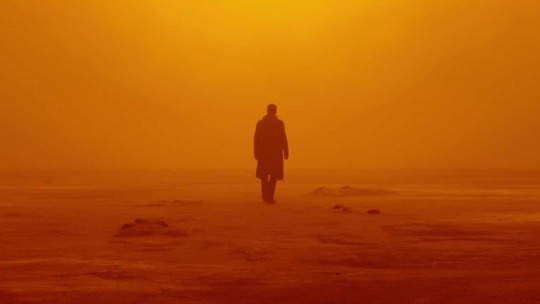
Directed by Denis Villeneuve
Cinematography by Roger Deakins
There wasn’t a more thoughtful film this year than Deakins’ visual magnum opus. The intelligence expected of Villeneuve surfaces throughout in beautifully complex questions about life, witnessing, and how we achieve our sense of identity.
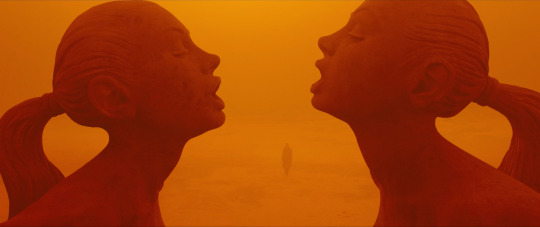
The choice of Gosling’s K / Joe as protagonist, his illusory sense of importance as the “one” and what is done with this concept, shows how important it is to value the willingness to make choices, even when they seem tiny and tossed into the void. In Joi, he may have found a facsimile of love, or he may have actually found it. In response, we question our right to declare another’s life or love “artificial”. The Hero’s Journey archetype is so common that it’s almost instinctive. Villeneuve subverts these expectations by stripping heroic action to its purest and leaving us with K / Joe’s not-tears in the ashen snow.
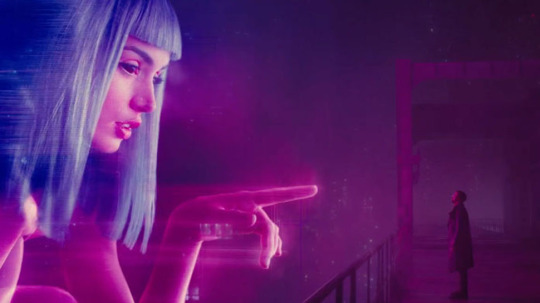
The acting is typically strong because, while he isn’t noticed for it, Villeneuve always gets strong work from his actors. Through one of Harrison Ford’s best performances, the theme of parents, children, and sacrifices made just for the latter’s prospect of a better life is most poignantly rendered in one line: “Sometimes to love someone, you got to be a stranger.” As 2017’s best sympathetic villain, Luv doesn’t possess the freedom of her inferior replicants; she is bound to Wallace, a slave in her programming. Wanting to be special, to be the “best one”. This denied want and inability to make her own choices, to create life and be alive, warp her into a destructive force seeking to stomp out anything that reminds her of her chains. Leto’s megalomaniac Wallace is a god-aspiring big bad in the Greek chorus role, showing up to voice the film’s themes but in a way that avoids ponderousness.
I could write an essay on this film. (Note to self: write more essays on films.)
3. Lady Bird
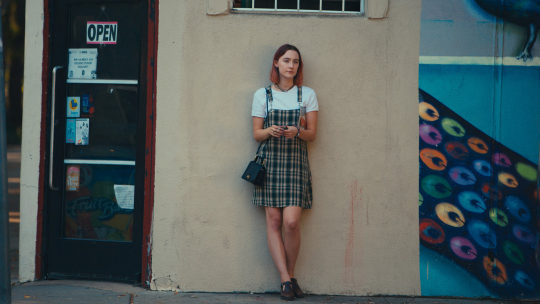
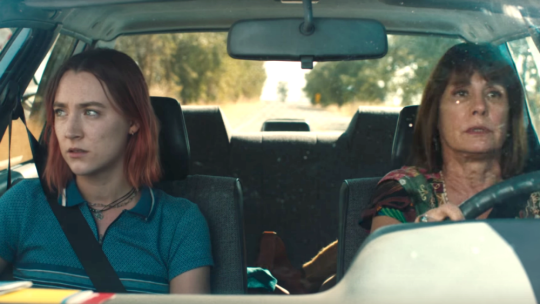
Written and Directed by Greta Gerwig
Gerwig’s work is so accomplished that my mind boggles when contextualizing it as her first directed film. The movie world exists here as specific enough to leap outside of time and place in that mysterious dynamic of singular-becoming-universal. Coming of age stories with comedy draped around them, or them around it, are usually judgemental of broad supporting characters who get portrayed in one shade only. This film is so balanced and sympathetic to its people, and I say “people” with intention, that we turn from cursing them to pitying to loving as fluidly as we do from laughing to choking up. The final sequence might be the year’s most affecting editing through a use of different characters in essentially the same shot, and shows that car chases have nothing on cross-cutting between drivers in the Sacramento magic hour.
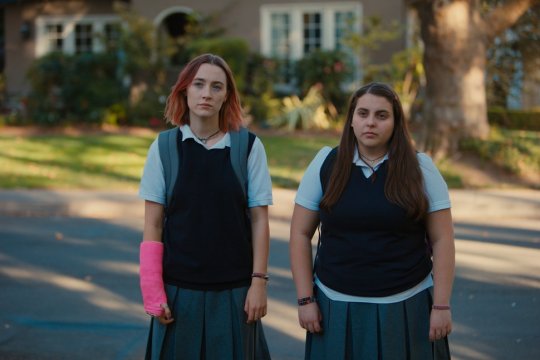
2. Columbus
Written and Directed by Kogonada
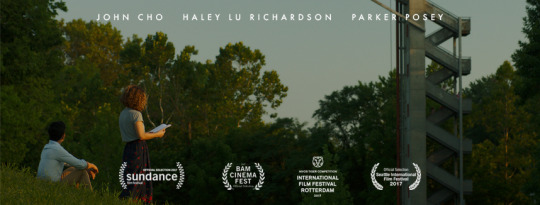
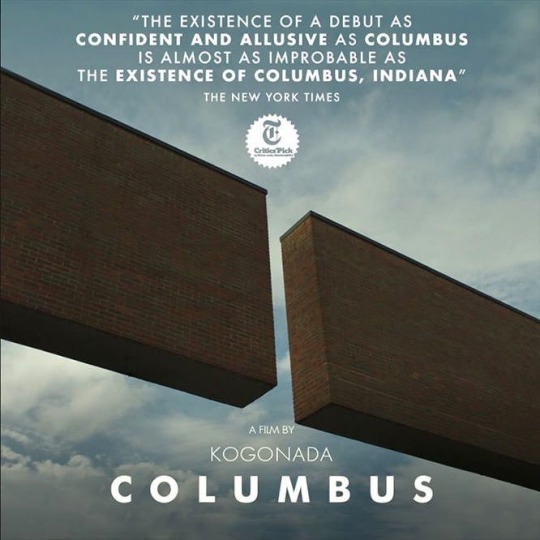
Sheila O’Malley in her Rogerebert.com review:
"Columbus" is a movie about the experience of looking, the interior space that opens up when you devote yourself to looking at something, receptive to the messages it might have for you. Movies (the best ones anyway) are the same way. Looking at something in a concentrated way requires a mind-shift. Sometimes it takes time for the work to even reach you, since there's so much mental ballast in the way. The best directors point to things, saying, in essence: "Look." I haven't been able to get "Columbus" out of my mind.
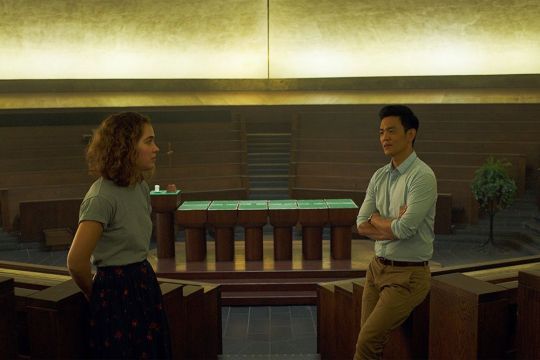
Wholeheartedly agreed. It clung to me. First time director Kogonada gives us an immaculate use of the frame and mise en scene. My eyes wanted desperately to eat the screen, each and every frame a morsel. And my entire being wanted to remain in the film’s world. Sadness and all.
Kogonada’s work isn’t all visual gloss but uses stillness and subdued conversations to belie an emotional tempest inside each of the two characters. This is a romance, but one just as in thrall with life as it is with clean modernist lines and the creation of form through negative space that here symbolizes those unknowable aspects of Jin and Casey (Haley Lu Richardson lights the screen in my favorite performance this year), and by extension those they love. We carry our parents with us just as these buildings carry their histories. Columbus’ characters need to navigate the empty spaces in and around themselves to connect, even if fleetingly.
1. Dunkirk
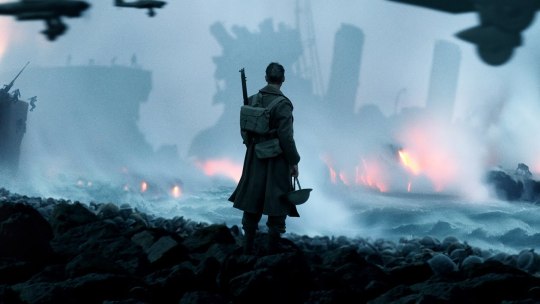
Written and Directed by Christopher Nolan
Cinematography by Hoyte Van Hoytema
Score by Hans Zimmer
I can rightfully be called a Christopher Nolan fanboy, but there’s no arguing the viscerality of this experiment. Nolan, Hoyte Van Hoytema, Hans Zimmer, and the rest of their collaborators crafted a singular war film that really isn’t a war film. It’s a story more existential. Time is elided, shattered, and edited with an exactitude that comments on history unlike any other movie in this genre.
That audiences responded to a story asking them to participate, emotionally and physically, but learn little of its characters is also fitting for the theme of people choosing to risk their own well being for the betterment of others. The lesson is to put aside your wants and let an experience take you.
The propulsive score, like the tension, never relents. How such induced anxiety can be thrilling is for later study (and this film will be studied for decades hence). It’s the notion, however, that I can be brought to tears by the shot of a Spitfire coasting across sky, out of gas but not fight, by small boats dotting the sea that are referred to as “Home”, and by Mark Rylance simply nodding to his son in acknowledgement that the right thing to do is often an act of empathy running against our in-the-moment emotional surge, that belies an elegance words can represent, but only sound and image can actually invite you to feel.
_______________________________________________________________________
We are born into a box of space and time. We are who and when and what we are and we're going to be that person until we die. But if we remain only that person, we will never grow and we will never change and things will never get better.
Movies are the most powerful empathy machine in all the arts. When I go to a great movie I can live somebody else's life for a while. I can walk in somebody else's shoes. I can see what it feels like to be a member of a different gender, a different race, a different economic class, to live in a different time, to have a different belief.
This is a freeing influence on me. It gives me a broader mind. It helps me to join my family of men and women on this planet. It helps me to identify with them, so I'm not just stuck being myself, day after day.
The great movies enlarge us, they civilize us, they make us more decent people.
-Roger Ebert
_______________________________________________________________________
Promising 2017 releases that I haven’t seen yet and might vie for retroactive inclusion on either this or the “Runners Up” list:
Star Wars: The Last Jedi
The Disaster Artist
Darkest Hour
Mudbound
First They Killed My Father
Spielberg
The Post
Molly’s Game
Phantom Thread
The Shape of Water
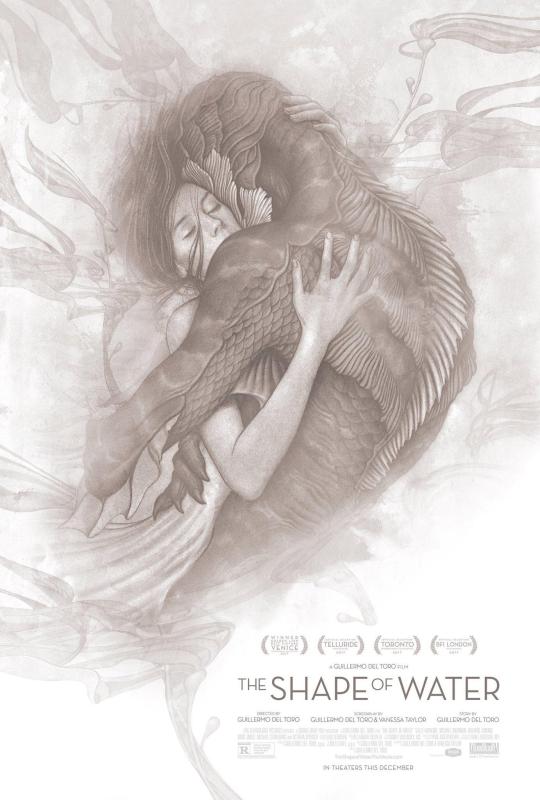
1 note
·
View note
Text
A Gentleman’s Guide to Vice and Virtue by Mackenzie Lee. A YA novel starring Monty, eldest son of an Earl in mid-1700s England, his childhood neighbor/best friend Percy, and his sister Felicity. The three of them are just about to begin a Grand Tour of Europe, their last summer of freedom and fun before Monty has to buckle down and behave like a noble heir, Percy starts law school, and Felicity is shipped off to a finishing school.
Unfortunately none of them are particularly looking forward to their futures. Monty is very cheerfully bisexual, and has engaged in romps, gambling, drinking, and drugs to the point of being kicked out of Eton. Percy is mixed-race (the son of a plantation owner, though raised by his aunt and uncle, minor gentry) and though he's tolerated, his existence isn't always well-regarded in their circles. Felicity is pissed off about being doomed to learn embroidery and manners instead of going to medical school to become a doctor.
Oh, and Monty is desperately in love with Percy, but is afraid to tell him and lose his friendship. This is just the beginning – as the book gets going, there are also revelations about epilepsy, child abuse, insane asylums, and more.
It's not all serious, though. In fact, most of the book is light-hearted fun: there are encounters with highwaymen, battles with pirates, parties at Versailles, Carnevale in Venice, villas on Greek islands, operas, fortune tellers, hostage exchanges, escaping thieves, and basically every adventure one could imagine in 18th century Europe. There's even a plot about alchemists and an elixir of immortality which, to tell the truth, felt a bit out of place in the otherwise historically-based book. And, of course, there is lots and lots of pining as Monty and Percy engage in the most excellent sort of romantic-comedy suspense, yearning and avoiding telling the truth about their feelings. A++, that bit.
My main complaint with the book is that Lee tries very earnestly to handle appropriately the issues of social justice she includes (racism, sexism, ableism, homophobia), but every one of the ensuing conversations feels very 2017-approved, with every term the correct vocabulary, every checkbox checked, every privilege painstakingly unpacked. Not that such views couldn't – didn't! – exist in the past, but the way Lee portrays them doesn't seem to relate to the characters or setting at all. They don't arise out of the environment of the book, but are dropped in wholesale from an outside perspective that wants to be sure we know the right way to think. And then there's the moment where one character tells another about how the Japanese mend broken pottery with gold seams, see, so that the broken places end up more beautiful than the whole, and it's meant to be a profound moment but it's just so embarrassingly like this person in the 1700s is reading off a tumblr post.
But nonetheless it's a funny, sweet book, if not quite as good as I expected when I heard "Gay Roadtrip through 18th Century Europe". What it reminds me most of all is reading an AU from a fandom you don't know. Maybe the characterization and setting isn't always that great but you don't care because it's not your fandom. It has the tropes you love and you can't wait to see the couple get together at the end, so you stay up late reading it on your phone. A Gentleman’s Guide to Vice and Virtue is that experience in original fiction.
Seven Surrenders by Ada Palmer. The sequel to Too Like the Lightning which I absolutely LOVED. However I really should not have waited seven months to read this one, because I'd forgotten some of the characters and plots and this is a series jam-packed with multitudes of characters and plots, and you better have every miniscule bit of such details ready at your fingertips to have a chance of following the action.
To briefly summarize the plot (a task that's probably impossible, but I'll try to hit the main points) in the 25th century the world has more or less become a Utopia. Nations have been abolished, religion banished to the private sphere, and gendered distinctions made it illegal; to all outward appearances, it is a world with no reason to go to war. Unfortunately it turns out that all of this has been made possible through carefully targeted assassinations, picking off key individuals to guide the world away from war, riots, major economic downturns, etc. Not many – about nine a year, on average, for the last two hundred years. This information sets off a flurry of activity as the characters take sides, variously trying to figure out the conspiracy behind it, hide the perpetrators, uncover proof, keep the public from finding out, and broadcast the secret to as many people as possible. When several world leaders turn out to be involved, chaos breaks out worldwide. It's not just drama, though; behind the action scenes is the frequently repeated question of if it was such a bad plan after all. Is it worth losing a few lives to prevent the millions of deaths that would happen in war?
Seven Surrenders is all about the philosophical dilemma. In addition to the one above, we get multiple debates over the riddle, 'would you destroy this world to save a better one?', and 'If God has revealed proof of His existence, why did He chose you above every human who's ever prayed to believe? And, more importantly, why now?' There is speculation about the power of gender, of sexual attraction, of the effect of raising children as experiments, of the role of Providence in life, of what it would mean for two Gods to meet, of how one conducts a war when there are no living veterans to teach the next generation. But there's plenty of action too – the book includes revelations of secret parentage, long-lost loves, a revenge story worthy of the Count of Monte Cristo, bombs, murders, resurrections, suicide attempts, cute kids, so many disguises, sword fights, gun battles, horse chases, and more.
Ultimately I didn't like it as much as Too Like the Lightning. It just didn't feel as deep or as grand, possibly because so much stuff was happening that none of it got enough exploration. One of the most best character arcs (Bridger's) happened mostly offstage, and many of the other characters were too busy reacting to the constantly changing political winds to have a real arc. I still recommend it, because it's just so different from everything else and I have to support an author who mashes up transportation science with Diderot's philosophy. But if you read it, definitely don't wait months between books.
The Cater Street Hangman by Anne Perry. A murder mystery, the first in a series set in Victorian London. Charlotte is the middle daughter of a middle-class family, believed by all to be firmly unmarriageable but happy enough with her staid life. The book opens with the murder of a young well-off woman, then Charlotte's maid is also murdered, as are several others. There is no apparent connection between the victims except that they're all young woman, all live nearby, and all were strangled. Inspector Thomas Pitt is assigned the case, and he begins to spend a great deal of time talking to Charlotte – first just to interview her regarding the murders, but then for her own sake. But will Charlotte's family allow her to marry a... policeman???
There are several interesting things about the book. Set very specifically in 1881 (which is to say, before Jack the Ripper) the very idea of a serial killer – as opposed to a thief who murders for money – is new and shocking to most of the characters. So is the concept that such a criminal could appear "normal", that rather than being a dirty, lower-class raving lunatic, it could be a respected neighbor or even a member of their own family. These are such self-evident ideas to modern people (and most characters in mystery books) that seeing Charlotte and the others wrestle with them, discuss their ramifications, and feel guilty for suspecting their husbands and fathers was pretty fascinating. I also liked that the family was so solidly middle-class. Historical fiction has a habit of gravitating toward extremes: everyone is either upper aristocracy or enduring the most grueling poverty. A family of boring bank clerks actually made for a refreshing change.
Unfortunately those are the only good things I have to say about the book. The middle 2/3rds of the story drags along interminably, as nothing happens except for characters having the same few discussions over and over again. Charlotte suspects her father! First she must have a conversation about it with her mother. Then her younger sister. Then her older sister. Then her mother and the older sister talk. Then the older sister talks about it to her husband. Then...
Well, you get the idea. And it's not as though each new character was bringing a fresh perspective and insight to the issue! No, we just get the same few protests and agreements recycled over and over in slightly different wordings. It's such an awful slog that I nearly abandoned the book. However, I stuck it out to the end, only to be rewarded with the reveal of the killer (warning for spoilers, I guess): a lesbian who has been driven mad by repressing her sexuality! You know, I don't think I've ever actually encountered this awful cliche in the wild before. It would almost be exciting, if it wasn't so offensive. Though there's not a lot of time to be offended, because the reveal, motivation, attack on Charlotte, rescue, and arrest all happen in the last two pages (literally) so none of it is exactly dwelt on.
It's probably all for the best that I disliked this book. It's the first in a 32-book series, and now I don't feel any desire to read the rest.
(DW link for easier commenting)(Also goddamn, I am so far behind on putting up my book reviews, you guys. So prepare for a lot of that.)
3 notes
·
View notes